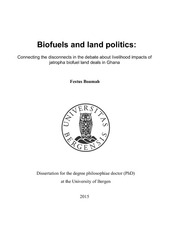| dc.contributor.author | Boamah, Festus | eng |
| dc.date.accessioned | 2015-05-06T11:49:43Z | |
| dc.date.available | 2015-05-06T11:49:43Z | |
| dc.date.issued | 2015-04-17 | eng |
| dc.identifier.isbn | 978-82-308-2661-4 | |
| dc.identifier.uri | https://hdl.handle.net/1956/9861 | |
| dc.description.abstract | In the 2003-2006 period, the Ghanaian government supported jatropha biofuel initiatives on so-called degraded land areas to reduce Ghana’s high oil import bills and to generate employment opportunities. However, after Ghana’s discovery of oil and gas in 2007, the government retreated from jatropha biofuel promotion, leaving the burgeoning biofuel industry to be dominated by chiefs, private investors and NGOs. Moreover, economic hardships that prevailed in Ghana as a result of the 2007-2008 global financial and oil crises compelled the Ghanaian government to subsidise both domestic fossil fuel prices and food crop production. The swift switch of the government’s attention to fossil fuel without formulating biofuel regulations created a leeway for allocations of productive land to biofuel investors by chiefs, who strategically categorised certain land areas as marginal land and therefore suitable for jatropha projects which were promised to be ‘pro-poor’. The situation generated a proliferation of reports analysing livelihood impacts of biofuel projects in Ghana. The reports were mainly based on media news headlines, anecdotal observations and short term fieldwork on biofuel projects or sometimes on unconcluded projects. The reports only to a limited extent discussed the diverse social networks upon which different people draw to access resources and the socio-political institutions that mediate resource access in place- and context-specific ways. Livelihood creation or loss related to biofuel projects was hence often represented as a one-time event. Moreover, the shifting authority over land between the Ghanaian state and chiefs since the pre-colonial period to the present and its implications for the recent large-scale land deals did not feature prominently in the land deals debate. This methodological incompleteness of the conceptualisation of local livelihoods and research on biofuel projects suggests that the discourses used in the representation of potential outcomes of biofuel projects often overlook the historical background of ongoing local land politics which are crucial for an understanding of contemporary agrarian development trajectories and of the ways in which resource access maneuvering spaces are defined by evolving social institutions in a specific polity. These crucial issues or what I call disconnects need to be included and thoroughly examined in the land deals debate. Drawing mainly on ethnographic fieldwork (household surveys, archival records, case studies, etc.), and follow ups on biofuel projects in Ghana for a period of over three years, the study shows that a person’s or a group’s recognition by legitimate institutional actor(s) is a prerequisite for the (re)gaining of resource access during and after biofuel project implementation. Since the institutions defining resource entitlement are in a constant flux, creating or sustaining livelihoods then becomes a process rather than as an event. The impacts of biofuel projects on livelihoods are therefore not simply shaped by ecological conditions or by the predominant livelihood activities in biofuel project areas. Using ethnographic methods and analysing qualitative data in detail and over time, the study connects the disconnects in the biofuel land deals debate. The study shows that specific biofuel projects may have differentiated impacts on the livelihoods of different individuals and social groups depending on: a) how apt particular individuals and social groups interact with the evolving social and political institutions in specific locations to create and sustain livelihoods; and b) how investors (re)negotiate local socio-political institutions in the implementation of biofuel projects. The study concludes that regulations that explicitly define the roles of the specific actors involved in biofuel projects and the establishment of a governmental institution enforcing the regulations can provide a promising avenue for better biofuel governance. | en_US |
| dc.language.iso | eng | eng |
| dc.publisher | The University of Bergen | eng |
| dc.relation.haspart | Paper I: Boamah, F. (2014) How and why chiefs formalise land use in recent times: the politics of land dispossession through biofuels investments in Ghana. Review of African Political Economy, 41(141), pp. 406-423. Full-text not available in BORA. The published version is available at: <a href="http://dx.doi.org/10.1080/03056244.2014.901947" target="blank">http://dx.doi.org/10.1080/03056244.2014.901947</a> | eng |
| dc.relation.haspart | Paper II: Boamah, F. & Overå, R. (Forthcoming) Manoeuvring to (re)gain resource access: Rethinking livelihood impacts of biofuels land deals in Ghana. Development and Change (revised and resubmitted). Full-text not available in BORA. | eng |
| dc.relation.haspart | Paper III: Boamah, F. (2014) Imageries of the contested concepts ‘‘land grabbing’’ and ‘‘land transactions’’: Implications for biofuels investments in Ghana. Geoforum, 54, pp. 324- 334. Full-text not available in BORA. <a href="http://dx.doi.org/10.1016/j.geoforum.2013.10.009" target="blank">http://dx.doi.org/10.1016/j.geoforum.2013.10.009</a> | eng |
| dc.subject | discourses | eng |
| dc.subject | livelihoods | eng |
| dc.subject | socio-political institutions | eng |
| dc.subject | households | eng |
| dc.subject | land deals | eng |
| dc.subject | chiefs | eng |
| dc.subject | biofuels | eng |
| dc.subject | Ghana | eng |
| dc.subject | global south | eng |
| dc.title | Biofuels and land politics: Connecting the disconnects in the debate about livelihood impacts ofjatropha biofuel land deals in Ghana | eng |
| dc.type | Doctoral thesis | en_US |
| dc.rights.holder | Copyright the author. All rights reserved | en_US |
